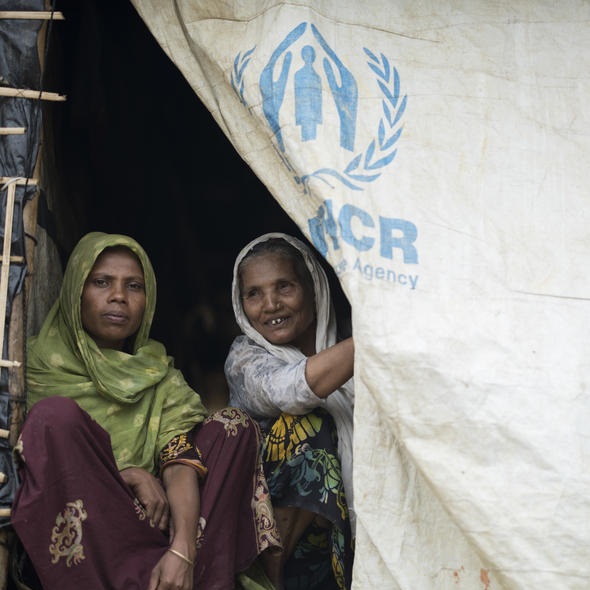Post Distribution Monitoring shelter and non-food items - September 2018
Bangladesh, 2018
Get MicrodataIdentification
UNHCR_BGD_PDM_2018_SEPTEMBER_v2.1
Post Distribution Monitoring shelter and non-food items - September 2018
| Name | Country code |
|---|---|
| Bangladesh | BGD |
Since 25 August 2017, human rights violations and targeted violence against the Rohingya community in Rakhine State, Myanmar, have forced over 728,0002 of them to seek sanctuary in Bangladesh. Half of the refugees (55%) are children. Within two months of the first arrivals, the number of refugee population in Cox’s Bazar district quadrupled, which made it the fastest growing refugee crisis in the world. The refugees continued to arrive by foot and boat in subsequent months. Most of them came with few belongings or cash. UNHCR was among the first humanitarian organisations to respond to the refugee influx with life-saving assistance. Packages of blankets, plastic sheets, sleeping mats, family tents, plastic rolls, kitchen sets, jerry cans and buckets were distributed initially to 250,000 refugees within weeks after their arrival. By end of August 2018, UNHCR distributed 93,803 Core Relief Item (CRI) packages to newly arrived refugee families, each containing tarpaulins, kitchen set, blanket, jerry can, bucket, sleeping mat and solar lamp. At the same time, 90,524 families received Upgrade Shelter Kit (USK) consisting of mulli and borak bamboos, rope, plastic tarpaulins, sandbags and toolkits, to reinforce their shelters for the monsoon season. UNHCR, in close collaboration with partner agencies and other humanitarian actors, continues to support the Government of Bangladesh in responding to the refugee crisis by ensuring relief items are prepositioned and delivered to the most vulnerable refugees and host communities in a timely manner.
UNHCR uses Post Distribution Monitoring (PDM) as a mechanism to collect refugee’s feedback on the quality, sufficiency, utilisation and effectiveness of assistance received. It is conducted after the distribution of relief items is completed. A total of 2,298 households were interviewed in this PDM. The PDM survey confirmed that non-food packages distributed by UNHCR and partners met the household needs and minimum quality standard as agreed by the Shelter/NFI Sector in Cox’s Bazar. The overall satisfaction score has improved from the previous survey in March. The refugees reported high satisfaction for the items received, and rated above 4.1 on a 5-point Likert scale for the items quality and usefulness. They also reported general satisfaction with the organisation of NFI distribution, with an average score of 4.0 on the Likert scale. The finding shows that UNHCR and partners are fulfilling their commitment to provide relief items that meet the specific needs of refugees, and that they were distributed in a timely and efficient manner.
Household.
Version
2.1: Edited, anonymous dataset for licensed distribuition.
Scope
The scope includes:
- Assistance received
- Information on quantity, quality and usefulness of non-food items received
- Actual use of items received
- Information on items distribuition and collection
| Topic |
|---|
| Core Relief items (CRIs) |
| Basic Needs |
Coverage
Cox's Bazar refugee camps.
Producers and sponsors
| Name |
|---|
| UNHCR |
Sampling
For this PDM exercise, sampled households were selected with 95% confidence level and 5% margin of error. In order to assure that a minimum target number of respondents was met for the desired level of precision, a 10% buffer was added, bringing the total randomly selected households to approximately 143 per settlement.
Sample weights for the household data were computed dividing, for each camp, the population by the sample size.
Survey instrument
Questionnaire contains the following sections: interviewee information; assitance distribuition information: compressed rice husk (CRH), core relief item (CRI), shelter kits, wash hygiene kit (including female hygiene kit); alternative use of assistance; distribuition methodology.
Data collection
| Start | End |
|---|---|
| 2018-08-29 | 2018-09-06 |
| Name |
|---|
| United Nations High Commissioner for Refugees |
A total of 2,298 households were interviewed by 60 trained independent enumerators from 29 August to 6 September 2018.
Data was collected using Kobo online data collection system.
Data processing
Data was edited and anonymised with local suppression and recoding. Twelve observations were removed because of their higher individual risk of identification.
Data Access
Cite as follows:
UNHCR (2018) Post Distribution Monitoring shelter and non-food items. UNHCR microdata library: https://microdata.unhcr.org
Contacts
| Name | Affiliation | |
|---|---|---|
| Curation team | UNHCR | microdata@unhcr.org |
